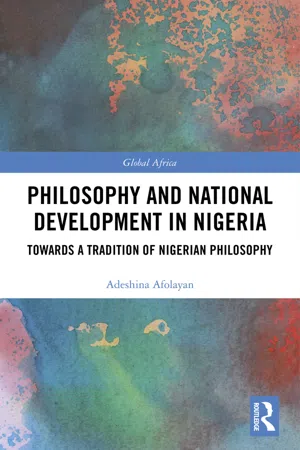
Philosophy and National Development in Nigeria
Towards a Tradition of Nigerian Philosophy
- 192 pages
- English
- ePUB (mobile friendly)
- Available on iOS & Android
Philosophy and National Development in Nigeria
Towards a Tradition of Nigerian Philosophy
About This Book
What does it imply for Nigerian philosophers to conscientiously and engagingly reflect on Nigeria as a place of philosophy and as a dynamic plural context of socioeconomic, political, cultural and ethnic problems? Any answer to this question automatically constitutes the opening salvo to the reflection on the evolution of a Nigerian tradition of philosophy and philosophizing. This book represents such an initial salvo in in its attempt to hammer out the conditions for the possibility of a Nigerian tradition of philosophy by placing that endeavor in between the triadic challenges of the Nigerian political economy, the African philosophical theorizing and the global epistemological hegemony. How do these three dynamics condition the evolution and functional relevance of the philosophical enterprise in Nigeria? How have Nigerian philosophers responded to them? What is Nigerian philosophy? How can there be a "Nigerian" philosophy when there are no Nigerians? This book is also an attempt to contribute to the trajectory of philosophy education in Nigeria within the context of a postcolonial educational system and university dynamics that stultifies the role of the intellectuals in development.
From Plato to Wiredu, from Bodunrin to Bourdieu, and from Heidegger and Nietzsche to Fanon, Mignolo and Santos, the book traces a trajectory of dynamics rethinking of existing paradigms and epistemological assumptions that could enable a robust evolution of a Nigerian tradition of philosophy that possesses sufficient clout to confront its historicity and its place in Nigeria's development impasse.
Frequently asked questions
Information
Table of contents
- Cover
- Half Title
- Fm
- Title
- Copyright
- Dedication
- Contents
- Preface and acknowledgments
- Introduction
- 1 The incidence of philosophy in Nigeria
- 2 The homo academicus Nigerianus
- 3 The Nigerian state encounters philosophy
- 4 From Western epistemology to popular epistemologies
- 5 Nigerian philosophy without Nigerians? Tradition, philosophy and plurality in Nigeria
- 6 The national character of philosophy
- 7 Philosophy and the idea of thinking
- 8 Bios theoretikos/bios politikos: Theory, practice and the challenges of a Nigerian tradition of philosophy
- 9 Social philosophy as social hope: Nigerian philosophy and the archaeologies of governance
- Conclusion: Envisioning Nigeria—Towards a postmetaphysical Nigerian philosophy
- Index